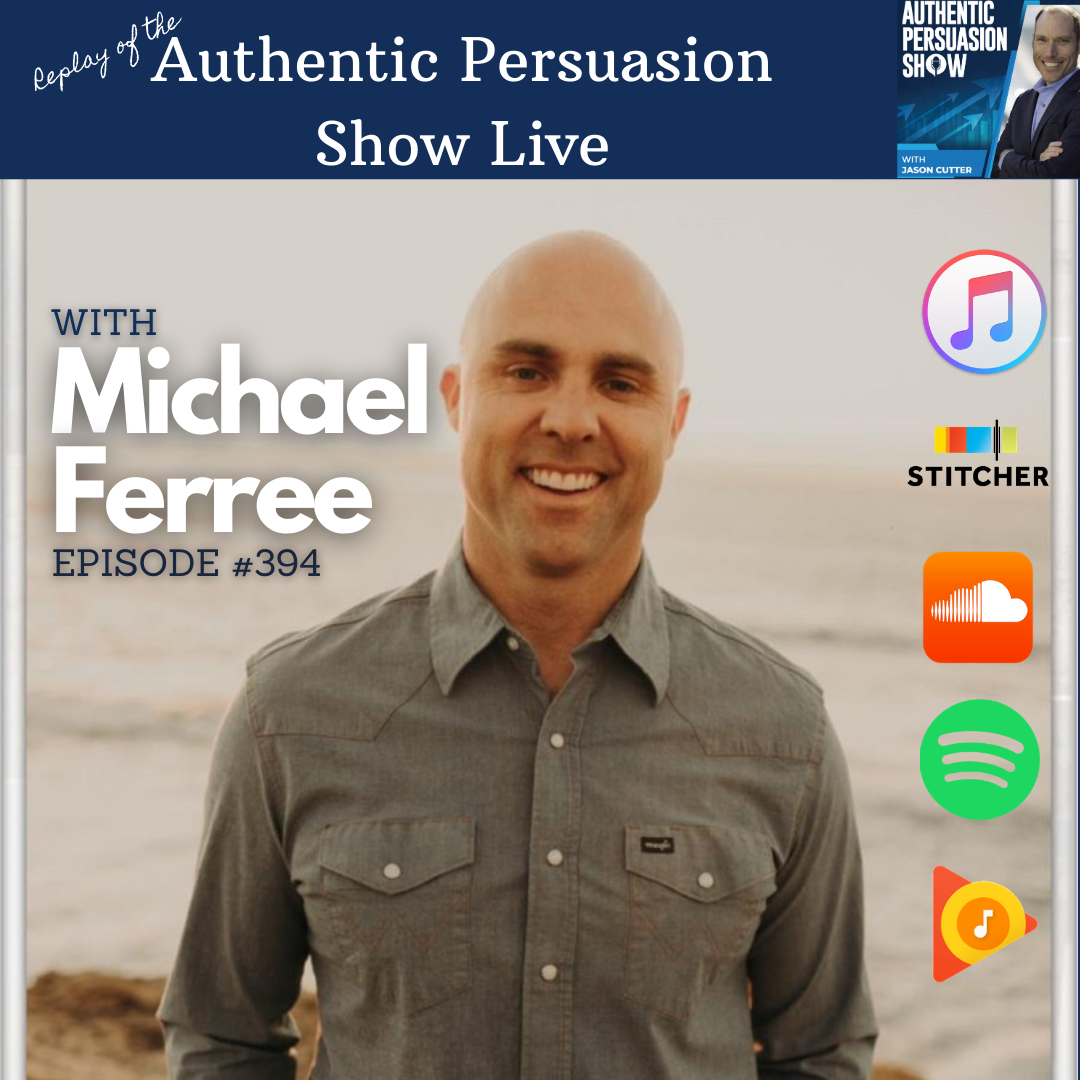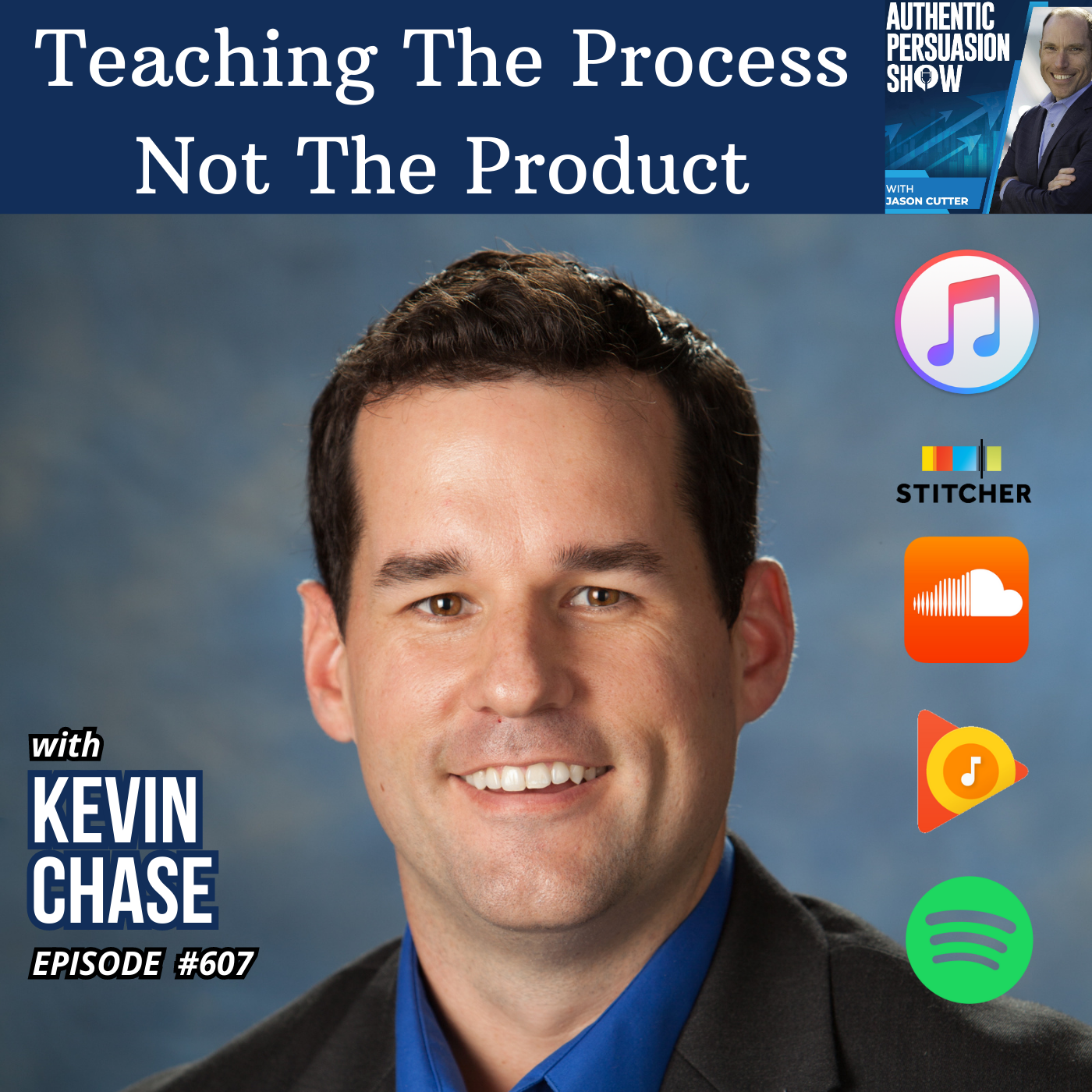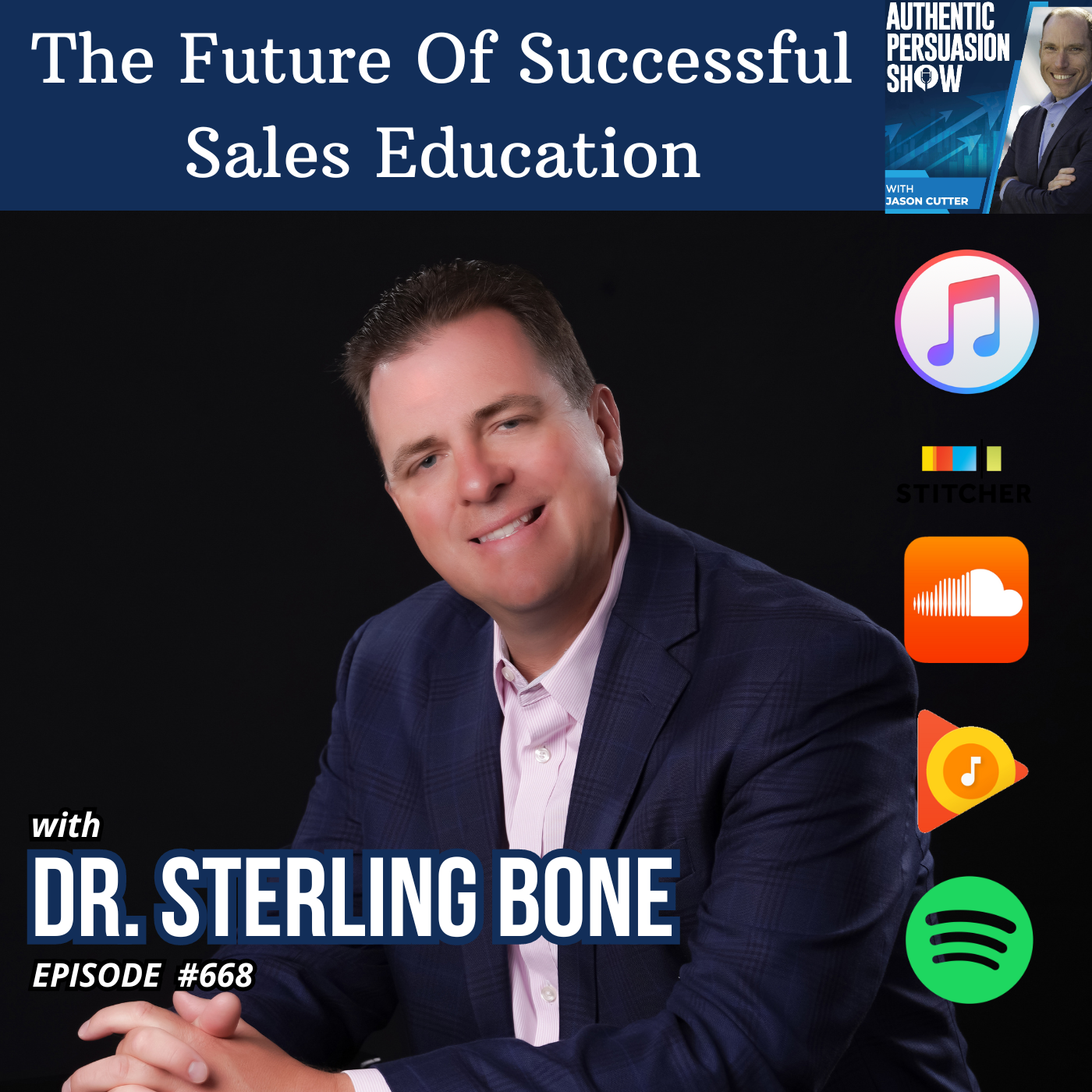Show Notes
This is part four of the conversation I had with Nelson.
In Part 4, Nelson and I talk about:
- What’s your hourly rate, and why does it matter?
- The classics: asking questions and actually listening
- Playing the long game
- Fill your calendar with priorities
Download The Power of Authentic Persuasion ebook
Enroll in the Authentic Persuasion Online Course
Connect with Jason on LinkedIn
Connect with Nelson on LinkedIn
Nelson Bruton Bio:
Nelson Bruton, President of Interchanges, a digital marketing agency, has been fascinated with the Internet since AOL, Compuserve and Prodigy used to send out their free trial discs. This led him to pursue a degree in Computer Science at the University of Georgia; until he realized in his first C++ class that his brain was not wired to code nor spend hours in front of a screen working on seemingly endless (and at that time in his life — meaningless) programs. Nelson switched his major to Economics and began studying the impact of the Internet on global economies.
Upon graduation, Nelson moved to Florida to live at the beach and pursue a career in sales to understand more about the fundamental driver of business. After a year or so working in the telecommunications industry, Nelson was introduced by a friend to Interchanges founder and CEO, Chris Patterson and the rest is history.
16 years later, Nelson remains excited as ever about his role to ‘help others reach exceptional levels of success while having fun along the way’. Today, Nelson and his team continue to offer a full suite of digital marketing solutions to many different industries including manufacturers, equipment dealers, home builders, and plastic surgery practices to name a few.
Website: https://www.interchanges.com/
Facebook Page: https://www.facebook.com/interchangesfanpage/
E163 – Transcript
Jason: Welcome to the sales experience podcast. So glad that you’re here. This is the final part, part four of four of my conversation with Nelson Bruton. Make sure if you haven’t to check out one, two, and three you can hear the conversation he and I have and how we got to this point and just continue on rolling. And at the end of the episode he mentions his links. You can also go to the website and find it there, but here you go. Part four. Enjoy.
Nelson: How do you start at the beginning of that to get towards that? I think it’s prioritization, right? Time prioritization, time management. Uh, that’s a whole another conversation of best practices in terms of time management. But yeah, making sure you’re managing your time wisely. Get off social media, pick a couple of times during the day to check emails. There’s all these tips and tricks on how to manage your time more effectively and that’s what you’ve got to start working on in order to get to the point to where, okay, now it makes sense for me to have an assistant or a virtual admin to help with some of this other stuff.
Jason: One of the biggest strategies I learned early on, and then I try to impart this to a lot of sales reps, is figuring out how much money you want to make. Like yes, there’s your big hairy goals. There’s like, what do you want to make? I want to make $1 million. Like, Oh, let’s be realistic. Like what do you want to make this year? What do you want to make in 2020 what is your goal? How much do you want to produce a stretch? You know, where do you want to be? Then break that up into an hourly rate. So if you take that dollar amount and you work it backwards and you say that’s $50 an hour, that’s $100 an hour. That’s $150 an hour, whatever that is. I found, I would put that on a posted note on my screen and be like, okay, this is it. If it’s not a $50 or $100 an hour worth of effort, I should have somebody else do it or I should put that on the back burner and focus on what I want to make and then that’s a good reminder for it. Social media getting trapped in meetings, getting trapped, you know, on long lunches that are pointless or you know, emails and getting varied in that. It’s like, is that helping me get to my goal? Is that a hundred or a $50 an hour type of task? Like is this helping more? I want to be,
Nelson: Yup, you’re right. You mentioned something else too that I, this is best practice and most of my sales nowadays are done virtually. There was a time when I was running all over the city running meetings and there is a lunch trap. Anytime I learned somebody wanted to schedule a lunch, I figured it was way better. You know what, lunches are tough for me. Can we do a coffee? You can get in and out of a coffee meeting and have much more conversation and not spend as much money on the lunch and have the rest of your day. You know what I mean? So I started gearing people towards scheduling coffee meetings or just meetings in general instead of trying to schedule a lunch meeting.
Jason: Yeah. Cause with the lunch year it’s kind of an obligatory expected 45 minutes, hour long vein. A lot of chit chat. If it’s relationship building or an important key client and you want to meet with them and you know that’s a deeper level. That’s one thing. Prospecting, meeting or getting to know somebody. Maybe even, you know, a good compromise, which I’ve done in the past, which is Hey about this, I’ll pick up lunch and bring it to you and then we can meet in your conference room and then you’re saving all that step and it’s like okay cool. Let’s have lunch in your office, let’s eat, let’s talk. You know, that’ll save you some time and a little extra value for them. Yup. For sure. Okay, so now what about, so that’s the top reps. what about reps who are unsuccessful? Are they missing? What could they be doing outside of what we’ve already covered? Like what do you see unsuccessful reps doing in addition?
Nelson: Gosh, let me think. That’s a good question. I think you really have to be built for sales. You know what I mean? The unsuccessful reps that they don’t want to put the work in, they’re not hungry enough. I think from a philosophical perspective, that’s, that’s kinda the main thing I see. You got to not want to be on a salary. You gotta be a Hunter. Right. And they’re hard to find and there are fewer and fewer of them out there. We’ve had reps over the years that have worked with us and they had done fine if we continuously provided them with an endless flow of leads. Right. But to go out and generate new business, that’s a, it takes a special type of person,
Jason: Especially if you’re talking about, you know, pure outbound outside kind of Hunter mode. Yes. That is somebody who is purposefully built and driven and motivated at a deeply intrinsic level.
Nelson: Yup. Absolutely. Then now for the people who maybe there’s a combination, there’s some expectation about bound, but you got your business is doing a good job marketing. There’s leads coming in. I think the fundamentals there for reps, you know the skill set, the most important skill set and when I interviewed sales reps, I asked him this question actually, what do you think the most important aspect of sales is? And they go through, I’ve heard a myriad of answers and my personal opinion is the ability to ask good questions and listen to the answer. If you can do that and master that skill, you will be successful in sales.
Jason: It’s so fascinating because as I’ve been going through this season of the podcast and interviewing a lot more people and talking a lot of people and then also reflecting on my experiences and what I know works well, that’s the number one thing. If there’s one thing in common with every single sales professional sales leader, coach, business consultant, people like yourself, it’s, it’s that asking questions and then actually listening and then going deep with the information you hear. Yeah,
Nelson: Yeah. That’s it.
Jason: That’s it.
Nelson: Last but certainly not least, you got to have fun. If you’re not having fun, they ain’t worth doing because life is short.
Jason: And so what does that look like for you? You know, have fun obviously in life, but in the sales role, what does that look like? What does that feel like when a rep is having fun in sales?
Nelson: I mean, I think it’s, um, you know, they’re, they’re, they’re full of energy. They know what they have is going to be valuable to the people they’re talking to. It’s that belief in themselves is the belief in their company. And, uh, you know, being able to celebrate the small victories, knowing that the big victories coming, I mean that just, just that energy that comes from having a good sales pipeline and working it hard. You know what I mean? I think that, yeah,
Jason: And being balanced with the optimistic side and then also taking the feedback in and wanting to improve, like we talked about early on in the conversation, but then also just optimistic. Like, I know if I work hard enough and I put in enough effort, I will win. Even if I heard no 50 times today, you know, whatever, it’s just a numbers game.
Nelson: Yup. They’re lost. Next. You know,
Jason: Their loss.
Nelson: Actually, no, that’s something else that I just thought of. Everything changes with time and circumstances.
Jason: Okay.
Nelson: No, I can’t tell you how many accounts I’ve called on six years, seven years, eight years later. It’s three people there. Something’s changed in the business and boom, they sign up. So you know that that is a longterm mindset. But if you plan accordingly, take your followup seriously. And actually that’s another topic. So you know, everything changes with time of circumstance. So if it’s a perfect candidate for your business and you know you can help them, even though you might get a no, now put a reminder on your calendar to follow up in a year or six months. Check in, see how they’re going. Ask him if anything’s changed. And you’ll be surprised how many people will say, you know what? I’m glad you reached out this and this has happened. Let’s set up a meeting.
Jason: Yeah. Nurturing those pipelines. Looking at the long game, if you’re trying to be a sales professional in a role, long term, you see it as a career, then you will have those where it’s a year, two years, five years, somebody out of the blue business to business, business to consumer. I’ve seen it on both. We’re literally just someone says, okay, now I’m ready. Or now my situation has changed. It’s about nurturing it and from a standpoint of knowing that it’s the best fit, right. And not from a scarcity like I need this deal, but from an abundance like I know you have a problem or a situation, I know I can fix it. Also just doing things the right way where they want to talk to you, even if it’s a new person, but you’ve done the right thing for them in the interactions for and they’re like, okay, this person actually cares.
Nelson: Yup. And so, um, you know, something else you know that I was talking long ago, who were the most successful people typically in a community, right? Doctors, lawyers, professionals, professionals. And what do they have in common? The calendar is always booked up. Right. And so one of the things that I’ve done is I’m gonna share my screen here for a moment, if that’s okay. Yeah. And this is an adjustment I made actually earlier this year. You’ve got to constantly evolve as a salesperson, right? And so what I do, I use my calendar to plan my followups and track my activity with all of my followups. Perfect. What you’re looking at is actually two weeks from now, this is a the week of December 16th he’s planning on not working, but you know what? People are more responsive this year. Last year it stopped at about mid Thanksgiving timeframe, but people are still talking and want me to follow up with them. So like in my followups on my calendar, I put all my activity history in here, right? So
Jason: And for people listening to the podcast, so basically in his Google calendar for his email, just tons of reminders with tons of notes in the fields, which just everything. So literally when that pops up you can just see it. Like basically if something were to pop up in your CRM, the downside I see is that, you know, usually all of this information is in a CRM. It’s in your HubSpot’s, in your Salesforce, whatever it is. But that the reminders that pop up and the tasks usually get ignored over time. And I know for myself, what I’ve found is exactly that where if I put it in my calendar, it’s going to pop up. And then sometimes even if that’s just a link to go into the CRM or the notes, then you’re going to be more likely to actually do it.
Nelson: Yup. And this goes into what we talked about at the beginning of the call, you know, find what works for you. You know what I mean? Cause I was, I was, I hadn’t stuff in my CRM and I was just, they were piling up. But now I know it’s on my calendar for that day. I’ve got a grant, this is what I’ve got to get done today. And if I get done ahead of time, I’m going to pick a couple from the next day and try to get them done. You know what I mean? So for me it has absolutely been amazing and yes, that information does not exist in a CRM, but it exists in my calendar, which is kind of acting as my CRM. So I figured, Hey, I’m going to keep doing it. Yeah.
Jason: And fundamentally, that’s the key, right? So if you’re a salesperson at a company and you have a CRM, you have a system, a process, obviously you got to put in the information to that and you don’t necessarily want to duplicate it. I see a lot of reps who are like, I hate the CRM, so I’m going to do it my own way, and then they have like two or three things and then nothing’s working or it’s all over the place. Yep. Make sure you pick a system that works for you and for the company that you’re at. If you’re an employee, obviously as a manager, develop the right system that a lot of people could use, and then some flexibility, but just find something that works and then focus on those numbers though, the things that you have to do to call a day successful. Whether they’re sales or not, but you know, if you do this many calls, this many followups, you plant this many seeds, you will win longterm consistent activity. We’ll help you with the consistent activity like you said. Perfect. Um, so Nelson, I appreciate you being on here so that people can find more about you, your company, what you guys are doing as a business, but also you other than LinkedIn, which you mentioned, which I know that you’re big on. Where else can people find you?
Nelson: I mean, I think that’s probably the best place to find me. You know, Nelson Bruton and find me on LinkedIn. There can’t be too many of me interchanges and uh, otherwise you can uh, shoot me an email if you have questions. I’m always open to connect with people and help. Any way that I can. My email is [email protected]. Yeah. Yeah. I appreciate you having me on
Jason: Nelson. Thanks for being on here and sharing all that wisdom. I love it. I haven’t had a guest before actually pull out the list of things that they’ve seen and go through them. So this should be really fun and a lot of links. I’m gonna put in the show notes and in the transcript. So thank you again for being on the sales experience podcast.
Nelson: Very good. Have a great day.
Jason: Alright, thanks. And for everyone listening, make sure to go to cutterconsultinggroup.com where you can find the transcript. All of Nelson’s links, all the stuff that we talked about in here. I’m going to put different links in there so you can find it easily like the Zig Ziglar stuff. And as always, keep in mind that everything in life is sales and people remember the experience you gave them.
![[E163] Optimizing Lead Generation with Nelson Bruton – Part 4 of 4](https://episodes.castos.com/salesexperiencepodcast/images/Nelson-Bruton-Cover-Image.png)


